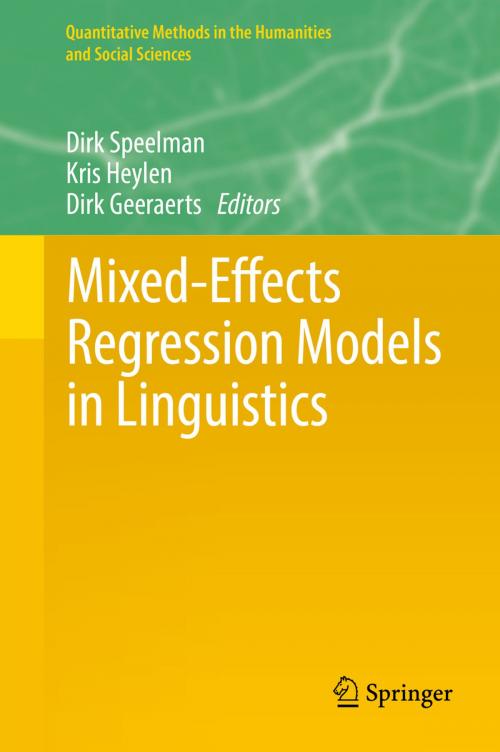Mixed-Effects Regression Models in Linguistics
Nonfiction, Social & Cultural Studies, Social Science, Statistics, Reference & Language, Language Arts, Linguistics| Author: | ISBN: | 9783319698304 | |
| Publisher: | Springer International Publishing | Publication: | February 7, 2018 |
| Imprint: | Springer | Language: | English |
| Author: | |
| ISBN: | 9783319698304 |
| Publisher: | Springer International Publishing |
| Publication: | February 7, 2018 |
| Imprint: | Springer |
| Language: | English |
When data consist of grouped observations or clusters, and there is a risk that measurements within the same group are not independent, group-specific random effects can be added to a regression model in order to account for such within-group associations. Regression models that contain such group-specific random effects are called mixed-effects regression models, or simply mixed models. Mixed models are a versatile tool that can handle both balanced and unbalanced datasets and that can also be applied when several layers of grouping are present in the data; these layers can either be nested or crossed.
In linguistics, as in many other fields, the use of mixed models has gained ground rapidly over the last decade. This methodological evolution enables us to build more sophisticated and arguably more realistic models, but, due to its technical complexity, also introduces new challenges. This volume brings together a number of promising new evolutions in the use of mixed models in linguistics, but also addresses a number of common complications, misunderstandings, and pitfalls. Topics that are covered include the use of huge datasets, dealing with non-linear relations, issues of cross-validation, and issues of model selection and complex random structures. The volume features examples from various subfields in linguistics. The book also provides R code for a wide range of analyses.
When data consist of grouped observations or clusters, and there is a risk that measurements within the same group are not independent, group-specific random effects can be added to a regression model in order to account for such within-group associations. Regression models that contain such group-specific random effects are called mixed-effects regression models, or simply mixed models. Mixed models are a versatile tool that can handle both balanced and unbalanced datasets and that can also be applied when several layers of grouping are present in the data; these layers can either be nested or crossed.
In linguistics, as in many other fields, the use of mixed models has gained ground rapidly over the last decade. This methodological evolution enables us to build more sophisticated and arguably more realistic models, but, due to its technical complexity, also introduces new challenges. This volume brings together a number of promising new evolutions in the use of mixed models in linguistics, but also addresses a number of common complications, misunderstandings, and pitfalls. Topics that are covered include the use of huge datasets, dealing with non-linear relations, issues of cross-validation, and issues of model selection and complex random structures. The volume features examples from various subfields in linguistics. The book also provides R code for a wide range of analyses.















